 Petzlover
Petzlover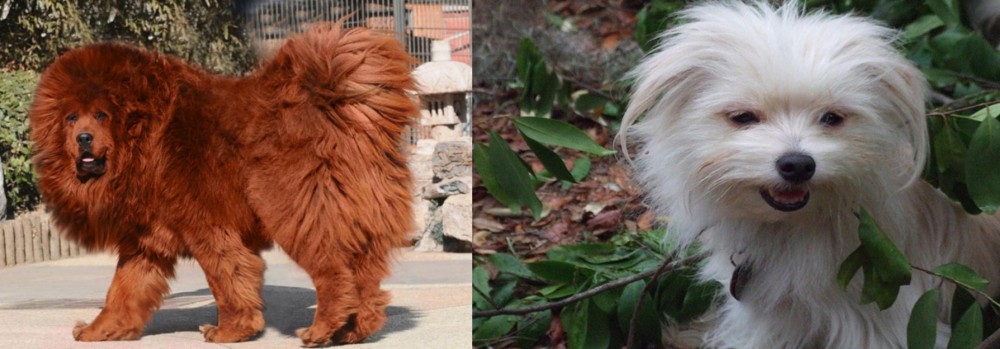 Himalayan Mastiff is originated from India but Malti-Pom is originated from United States. Himalayan Mastiff may grow 43 cm / 17 inches higher than Malti-Pom. Himalayan Mastiff may weigh 73 kg / 161 pounds more than Malti-Pom. Both Himalayan Mastiff and Malti-Pom has same life span. Himalayan Mastiff may have more litter size than Malti-Pom. Both Himalayan Mastiff and Malti-Pom requires Moderate Maintenance.
Himalayan Mastiff is originated from India but Malti-Pom is originated from United States. Himalayan Mastiff may grow 43 cm / 17 inches higher than Malti-Pom. Himalayan Mastiff may weigh 73 kg / 161 pounds more than Malti-Pom. Both Himalayan Mastiff and Malti-Pom has same life span. Himalayan Mastiff may have more litter size than Malti-Pom. Both Himalayan Mastiff and Malti-Pom requires Moderate Maintenance.
 The Himalayan Mastiff or Tibetan Mastiff is an ancient breed. Bred to be guardians of the flock, they could take care of leopards and wolves or anything else that tied to hurt the flock. The Himalaya Mastiff is found in the Himalayan area of Tibet. They are descendants of the Tibetan dogs that developed almost any Mastiff or Molosser on earth. They may have been in the mountains since the early 1100 BC. and have been fairly isolated. It was in this isolation that the Himalayan Mastiff developed.
The Himalayan Mastiff or Tibetan Mastiff is an ancient breed. Bred to be guardians of the flock, they could take care of leopards and wolves or anything else that tied to hurt the flock. The Himalaya Mastiff is found in the Himalayan area of Tibet. They are descendants of the Tibetan dogs that developed almost any Mastiff or Molosser on earth. They may have been in the mountains since the early 1100 BC. and have been fairly isolated. It was in this isolation that the Himalayan Mastiff developed.
Their function at that time was mostly to guard property. In some circumstances an entire village is guarded by one dog. It was also during this period that the breed was taught to be aggressive by tying them up as puppies. They guarded families while the men moved the village flock higher up in the mountains. They stayed in isolation until the mid-1800’s when the Queen of England was given a Himalayan Mastiff. For thousands of years, this dog was a nomad.
Soon the breed was being exported to England. A standard was developed, and the British began to breed them. Next, they were exported to Nepal, Afghanistan, India and the United States. They are rare in Tibet these days but more popular than ever in England and the United States. The first American Himalaya Tibetan Mastiff Association came into being in 1974 and in 2006 it was recognized by the AKC.
Today in the West, the Himalayan is a domesticated, family dog. It hardly fits in an apartment of course. These new western Himalayan Mastiffs are more easy- going than the Tibetan ones, but they are still wary of strangers and somewhat aloof. They are also still very protective and nocturnal. They are smart, independent and stubborn. They are not easy to train but socialization and obedience training is essential.
A study done in 2011 showed that it is very likely that many large breed dogs were descended from this Mastiff. This includes the St. Bernard, the Rottweiler, Bernese Mountain Dog and the Great Pyrenees. Later studies showed that the Mastiff’s ability to survive in the rare air of the Himalayans was due to interbreeding with Tibetan wolves in ancient, prehistoric times. Now they are competing in the Westminster Kennel Club Dog Show.
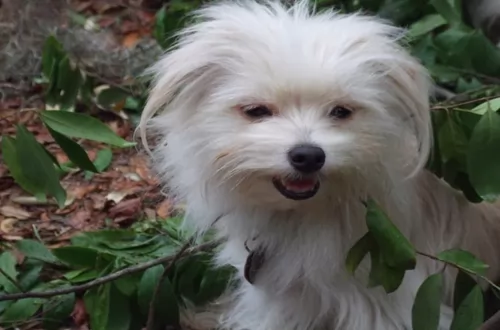 The sweet little Malti Pom is a dog which comes from crossing two purebreds – the Maltese Poodle and the Pomeranian.
The sweet little Malti Pom is a dog which comes from crossing two purebreds – the Maltese Poodle and the Pomeranian.
The appearance of this dog will vary according to how much of each breed is in the dog. The exact origins of the Maltipom breed are unknown but many new dog breeds have originated in the United States.
The Maltipom is also not recognized by the AKC because it’s a hybrid of two pure breeds and not looked upon as a new breed. It is however recognized by the American Canine Hybrid Club.
 The Himalayan Mastiff is a giant, massive dog longer than it is tall. The breed has a heavy, broad head and square muzzle. They have black noses, a level bite and almond shaped, slanted, deep set eyes. They are brown, and the ears hang close to the head. They are heavy, muscular and sturdy. They have a feathered tail curving over their back. With a heavy, thick double coat and mane they resemble a lion at times. The coat can be brown, black, and gray-blue with gold or tan markings. These are impressive and noble dogs, athletic, with cat like feet. They are agile and light on their feet.
The Himalayan Mastiff is a giant, massive dog longer than it is tall. The breed has a heavy, broad head and square muzzle. They have black noses, a level bite and almond shaped, slanted, deep set eyes. They are brown, and the ears hang close to the head. They are heavy, muscular and sturdy. They have a feathered tail curving over their back. With a heavy, thick double coat and mane they resemble a lion at times. The coat can be brown, black, and gray-blue with gold or tan markings. These are impressive and noble dogs, athletic, with cat like feet. They are agile and light on their feet.
According to some breeders there are two different kinds or types of Himalayan Mastiff. These are the Tsang-khyi or the monastery mastiff type and the Do-khyi or the nomad mastiff type. The monastery is a heavier, taller dog who face is very wrinkled while the nomad is a leaner dog with less facial wrinkles. In any litter there can be both kinds. The kind of work that was given to each dog was dependent on their type. The Monastery kind is given stationary jobs and the nomad kind got the active jobs.
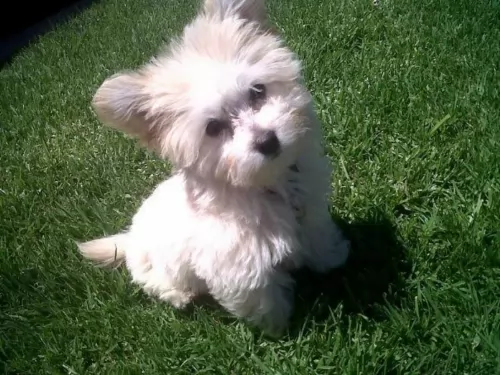 The Malti-Pom is a crossbreed, so pinpointing his exact size can be somewhat difficult, but you can expect him to be in the region of 20 to 28cm and weigh in at about 2 to 5kg.
The Malti-Pom is a crossbreed, so pinpointing his exact size can be somewhat difficult, but you can expect him to be in the region of 20 to 28cm and weigh in at about 2 to 5kg.
Both the Maltese and the Pomeranian are both toy dogs, so the Malti-Pom is almost sure to be a small dog. His appearance will also vary depending on which side he inherits most of his looks from. Generally though, he has a long coat of straight, soft hair.
He is a low shedder and with the poodle side of him he is looked upon as being hypoallergenic. The coat can be cream, apricot, white or black as well as a combination of these colors.
This is such a friendly, amicable little dog. He is good with children and can get on well with other pets in the home.Children should be taught to be gentle with any dog, but particularly a small one like this.
The Malti-pom is extremely loyal and affectionate with its family members, but ends to form a special bond with one member of its family.
These little dogs are generally reserved with strangers. They are well-behaved, sociable and can mix well with children and pets in the home. These toy dogs are clever so you won't battle with him with training and socialization.
Although the Maltipom looks cute and is an amicable dog, he can bark quite aggressively when he encounters strangers who he believes might harm his family. He makes a good watchdog.
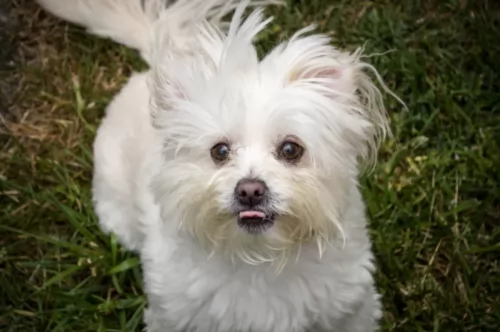 Because your Malti-Pom comes from two different dog breeds, you can’t really say what kind of personality traits he will inherit.
Because your Malti-Pom comes from two different dog breeds, you can’t really say what kind of personality traits he will inherit.
Both the Maltese and the Pom are small lap-type dogs who are essentially companion dogs. You can be sure your Malti-pom is going to be cute, social, energetic, vibrant and loving. They are able to adapt well to life in the city or the countryside and a nice walk every day will go down well in terms of exercise. It give your pet a chance to get outdoors and to sniff new scents.
With the Maltese and the Pom being the two parents of this dog breed, you can be sure that you’re going to have a splendid little pet who is guaranteed to bring lots of smiles into your home from his jovial, entertaining ways
 Being a large breed of canine, the Himalayan Mastiff has some of the typical health issues of large dogs. However, they also face a serious genetic disorder as well.
Being a large breed of canine, the Himalayan Mastiff has some of the typical health issues of large dogs. However, they also face a serious genetic disorder as well.
Canine Inherited Demyelinative Neuropathy (CIDN) – a fatal disorder seen in puppies by seven weeks of age. Puppies die before they are 5 months old.
 Fortunately, the Maltipom is considered to be a healthy dog, and he can live with you for a good number of years with good care. The Maltipom could develop heart issues.
Fortunately, the Maltipom is considered to be a healthy dog, and he can live with you for a good number of years with good care. The Maltipom could develop heart issues.
Heart disease is fairly common in dogs and some symptoms will include a cough, loss of appetite and he might tire easily. One of the common types of heart disease is degenerative valvular disease, where the heart valves fail.
It is believed that degenerative valve disease is a heart disease which accounts for about 75% of all heart disease in dogs. Diagnosing heart disease requires a number of different testing methods.
 This breed will eat less than you think they should but don’t overfeed. Puppies need a solid dry food for large dogs. You can free feed 1 cup three times per day.
This breed will eat less than you think they should but don’t overfeed. Puppies need a solid dry food for large dogs. You can free feed 1 cup three times per day.
For dogs over a year old you can free feed anywhere from two to four cups of dry food per day. Unlike many other breeds, the Himalaya Mastiff will only eat when hungry and they may not eat more than once a day. They will not overeat. The males might not eat at all when females are in season if they are around them.
They have good strength and athletic ability.
The Himalayan Mastiff needs regular, routine walks. It is important during these walks that the human leads the way, or the dog heals. Do not overwork a young Himalayan Mastiff. They need work related jobs like structured play time, walking the boundary of their territory, playing frisbee or catch. They work and play in short bursts then rest.
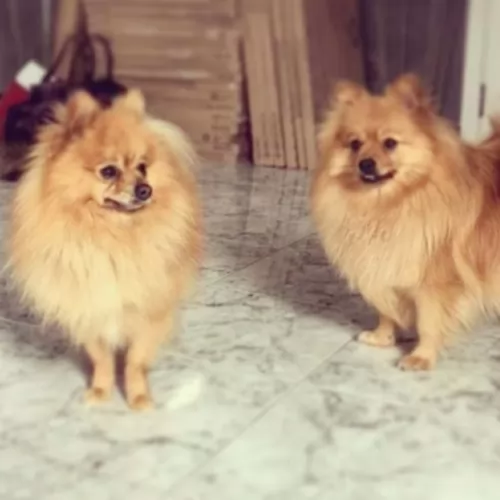 The Maltipom is a tiny dog, and that’s an advantage actually as he isn’t going to cost you too much to feed. Half a cup of food in he morning and another in the evening will keep him satisfied.
The Maltipom is a tiny dog, and that’s an advantage actually as he isn’t going to cost you too much to feed. Half a cup of food in he morning and another in the evening will keep him satisfied.
If you give him commercially manufactured food, choose a high quality one specially made for small dogs. You can chop up cooked chicken, brown rice or pasta and some cooked vegetables finely and add this to his dry kibble from time to time as a tasty treat.
A tiny little bit of raw meat once in a while will also keep him healthy. Keep things simple – don’t try all sorts of weird foods with him as he can battle with digestive problems.
Groom your pet. Brush him at least twice a week. Check his eyes and ears for infection and remember to brush his teeth at least 2 or 3 times a week with special canine toothbrush and toothpaste.
Make sure he is exercised. He'll love a walk each day.